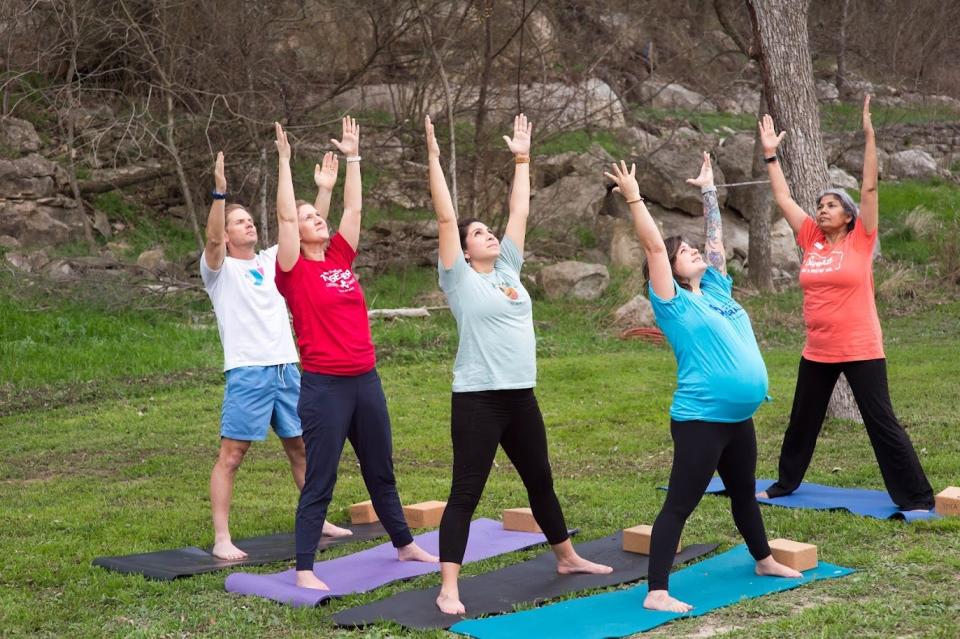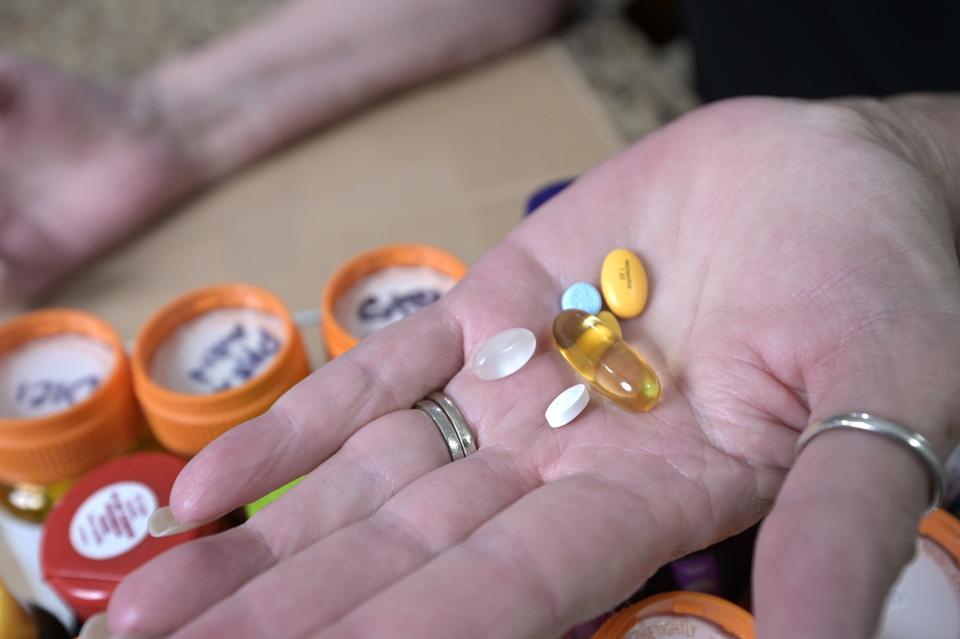10 things you can do to stay healthy this holiday season
The countdown is on to Christmas, Hanukkah, Kwanzaa, Winter Solstice, New Year's Day or whatever else you might be celebrating this time of year.
It's a busy season, filled with food, family, festivities, even frustrations.
How can we stay healthy through these next few weeks? We have tips from doctors, mental health and fitness experts to help you.
Holiday safety tips: Holiday safety tips: How to stay healthy, avoid the ER as you travel, celebrate
Be aware of the 'triple epidemic'
Right now, COVID-19, flu and RSV (respiratory syncytial virus) as well as other respiratory infections are spreading. Flu cases hit us early this year. About 6.25% of all doctor's visits in Travis County are for respiratory illnesses, and the flu positivity rate is 15.51%. These numbers are down from higher numbers that were seen in October, November and earlier this month, when the positivity rates were above 25% and the visits to doctor's offices hit 10% of visits. Flu has been responsible for 12 outbreaks in local schools.
COVID-19 cases are rising again. Travis, Williamson and Bastrop counties remain at the low level of activity, but Hays and Caldwell counties have moved up to the medium level, according to the Centers for Disease Control and Prevention. What's driving the change in levels is an increase of hospitalizations of people with COVID-19.

COVID-19 cases are rising. Locally, the case rates had been in the 20 to 60 per 100,000 people range for months. Recently they jumped to the 110s to 120s in each county. More counties in Texas have switched from low to medium levels, and a few in the Panhandle are now back to high levels.
Austin Public Health considers these numbers as having a high level of transmission, even if the CDC still has Travis County in the low level category.
RSV cases have been hospitalizing kids throughout the fall. While many of us think of it as a disease for young children, anyone can get it, and older adults or immune-compromised people also can struggle with it.
This triple combo of illnesses has filled hospitals locally. The Austin region has had no available pediatric intensive care unit beds for days at a time. Occasionally, that situation has spilled over to adult ICU beds as well.
Health in Austin: 'A terrible year': Austin area battling a particularly rough cold and flu season
What can we do?
"It's a game of risk vs. reward," said Dr. Mason Mileur, an internal medicine doctor with Austin Medical Associates. "Everybody is a little different with how much they want to risk."
Mileur offers these suggestions:
Get a flu shot and a COVID-19 booster if you haven't yet. You can get both at the same time.
People with more risk factors — such as being immune compromised or having conditions such as diabetes, obesity, asthma or other lung problems — might want to take additional precautions.
Allergy alert: Itchy, sneezy, miserable. Austin braces for arrival of an unwanted guest: cedar fever
You should not go out if you have any respiratory disease symptoms or are just not feeling well.
If you do decide to go out and will be in a crowded space, consider putting a mask back on.
If you're gathering with family or friends, call before you go to make sure everyone is feeling OK. Consider taking a COVID-19 home test before you go.
If you are feeling sick, try to get in to see your primary care doctor or go to an urgent care facility to be tested for flu and COVID-19. Both illnesses have antivirals that can be used to shorten the duration of symptoms if given within the first few days. Have your doctor call the pharmacy to make sure the antiviral is available. There have been shortages with these as well as some antibiotics.
Health in Austin: Children's hospitals in Austin, across Texas battling surge in respiratory viruses

Limit alcohol intake
People sometimes indulge during the holidays, said Dr. Vivek Goswami, a cardiologist with the Heart Hospital of Austin and Austin Heart, and people who have cardiovascular disease might be less able to accommodate that indulgence, he said. Often people don't know they have heart disease until there is an event.
Goswami points to a condition called "holiday heart syndrome." People go into atrial fibrillation, when the upper chamber of the heart isn't in a normal rhythm. That abnormal rhythm can cause the blood not to move regularly throughout the body, forming a clot that can cause a heart attack or stroke.
Alcohol can play a big role in Afib, as can having too much sodium or excess fluid. It's not just during these holidays that Goswami sees "holiday heart syndrome." He also sees it at the start of football season, when people are overindulging while tailgating.
Health prevention: Is your heart ready for winter? Tips for protecting yourself during cold weather
Alcohol also makes it harder for the body to metabolize the food you consume with it, Mileur said. "It becomes less efficient at burning fat," he said. Instead of metabolizing the food, it is working on metabolizing the alcohol, he explained.
Limit the alcohol as well if you are driving, Mileur said. You want to get home safely and not hurt someone else. Better yet, if you know you're going to go to a party and have a drink, use a ride-hailing service or designate a nondrinking driver.
Understand why you are drinking. Is it to enjoy the party or is it a coping mechanism?
"If you're using it as a medication, there is a lot better medications out there," Mileur said.
Try to make healthy food choices
Every year, patients come into Mileur's office weighing 10 pounds more after the holidays, he said. That affects chronic conditions such as heart disease and diabetes.
Excess sodium and fat also play a role in high blood pressure and heart disease.
Try to include fewer processed foods, more vegetables and more fruits instead of just the carb-heavy sides and desserts in your meals.
Healthy eating: Put down the coconut oil, red wine in new heart health dietary guidelines

Keep your normal exercise routine
It's easy to get off track this time of year, especially if you're traveling. The current recommendation for exercise for adults is 150 minutes a week.
Robbin Tran, the fitness and wellness director at Shalom Austin, recommends doing what she calls "exercise snacks" when you're busy: 15-minute sessions throughout the day. Do things that raise your heart rate, are weight bearing and provide resistance training to continue to build healthy bones.
For efficiency, Tran recommends pushups, squats, lunges, burpees and jumping jacks.
If you have only a short amount of time, go for intensity, Tran said. If you have a longer time, you can go for more moderate exercise.
Exercise craze: Austin-area doctors seeing more pickleball injuries. Here's how to avoid them
For days when you are stuck for hours in a car or airplane, Tran suggested fidgeting.
"Consider the safety of everyone else," she said, but tap your feet, or drum with your hands on the steering wheel. "We can burn substantial calories."
Think about ways you can turn the family gathering into a more active environment. Help out in the kitchen rather than watching TV. Set up the volleyball net or have a kickball tournament. Play charades.
This is not the time to suddenly become active if you've been inactive. Sometimes people do winter vacations that involve activities such as skiing, hiking or playing with kids and grandkids that aren't part of the normal routine. Accidents happen as well as things like heart attacks.
If you're thinking about getting ready to be more active in the new year, Tran recommends building up to that by adding more time or reps slowly, rather than showing up at the gym the first week of January expecting to be able to run a marathon on the treadmill.
Stay hydrated
It's easy to become dehydrated when we're busy or even when we're with family. Water helps keep vital organs functioning and makes you less likely to overindulge in alcohol or food.
The rule of thumb is that your urine should be clear in color.
Get good sleep
Most people need eight hours of sleep a day. The last four hours are particularly important, Mileur said, because that's the rapid eye movement sleep that helps us recharge cognitively.
When we're tired, we don't make good decisions. It can also affect our mental health.

Stay on top of medications
Sometimes people go on holiday vacations and forget their medications. If you use a national pharmacy, you can usually get your medications at another location. If not, your doctor can call them in to a pharmacy where you are. Keep taking these medications regularly.
If you need to do things like check your blood sugar or blood pressure, bring supplies with you and don't forget to continue to do the checks.
Lock up firearms
You might have people visiting or in the house who usually aren't there, including kids. Store guns unloaded in a gun safe, with the ammunition stored separately.
Look for other hazards for young children
If you have a pool, are there barriers around it?
Are the older kids' toys, which could be choking hazards, out of reach of a young baby or toddler?
If you have those button batteries, hearing aid batteries or other small batteries, are they stored safely away to prevent a swallowing tragedy?
Are the delicate or small decorations out of the reach of small children?
What about those dogs or cats that aren't used to small children or other people? Are they in a safe space away from people?
Look out for mental health
Whether you are feeling stress because of family gatherings or sadness because of isolation or a recent death, this can be a hard time of year for many people.
Emma Howitt, senior clinical director at Jewish Family Service at Shalom Austin, recommends making a short list of coping skills. Those can include doing a guided meditation with an app, or just exploring your senses or taking deep breaths.
It could be tuning in to your body and asking what it needs. Sometimes it might be a nap or some healthy food. It might be going for a walk and clearing your mind.
Mental health: How to navigate holiday grief after the loss of a loved one
Other techniques that can be good are talking to yourself the way you would talk to a friend. What advice would you give? What supportive comments would you make?
Prioritize what is important this season and what things you can take off the list.
Surround yourself with people whose relationships you treasure. For those relationships that are more difficult, form a plan for how and whether you might see that person, how you might respond, how you might take breaks during the visit.
Be present in the activities you choose to do or the family time you choose to have. Try to stop the multitasking and enjoy the people around you.
This article originally appeared on Austin American-Statesman: 10 things to do to stay healthy this holiday season

